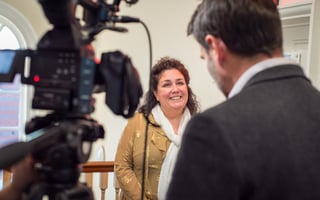It is not often tennis features in this media training blog.
Having a CEO refuse media training is a nightmare scenario for PR and comms officers.
Not only does it limit the organisation’s potential for positive media coverage but it also leaves it exposed in a crisis media management situation. If the brown stuff hits the fan who are you going to turn to?
Sure, you can use other recently media trained senior leaders, but your CEO really should be leading the response to any crisis which involves loss of life or serious injuries.
Often the greatest barrier to media training is that CEOs are experienced at presenting to large groups of people and some will even have faced intense public scrutiny by MPs or councillors. With experience like that why should they fear talking to a journalist?
Well, would that public speaking experience prepare them for the intensity of a doorstep interview, the uncomfortableness of a down-the-line interview or the unfamiliar surroundings of a television studio? Would they be familiar with the tricks and traps reporters regularly deploy to get spokespeople to say more than they intended?
Here are some of the reasons given by CEOs for not having media training and how you can overcome them:
They had media training years ago
The media world changes quickly and so do the techniques and methods used by journalists. Recent media training by current working journalists will keep your spokesperson up to speed with these changes and provide essential practice on controlling an interview and honing your messages. Being a media spokesperson is like any other skill – the more you practice the better and more successful you will be.
They don’t want to be embarrassed in front of the rest of the senior leadership team
Media training is not about embarrassing people but it understandable some CEOs may have a fear about a weakness being exposed to the rest of the leadership team. Our media training team is very respectful of the dynamics of a group and typically involves a lot of one-to-one coaching and guidance. That said, perhaps bespoke one-to-one training would remove this concern completely?
They prefer other people in the organisation to be spokespeople
There are of course many situations where your CEO does not need to be your spokesperson. If you have a pool of recently trained spokespeople, they can lead on most proactive work and many crisis scenarios. However, there are some crisis situations where the CEO must clearly be visible and that involves talking to the media. There are also wider benefits of media training. It teaches participants transferrable skills which can be used in different situations, such as boardroom meetings, clients meeting and conversations with colleagues.
They think they can handle a journalist’s questions
They may be experienced at handling questions from shareholders, partners, employees and officials but questions posed by a journalist are a different challenge. And if they simply answer the questions they will not get the outcome from the interview they are looking for. Media training will enable them to take control of the interview and get their messages across with confidence and clarity.
They are not expecting any media interest in the organisation
Crises can strike any organisation at any time. Even if your organisation has a relatively small profile an accident, IT failure, data loss or product recall, to give a few examples, could immediately propel it to the centre of the media’s intention. It is vital all organisations have a thorough crisis communications strategy or business continuity plan in place which includes a well-tested crisis communications plan.
They don’t see the value in giving interviews
Not only will speaking to the media promote the organisation and help ensure its messages and story is heard by a wider audience, but it will also raise the profile of the CEO in their sector and beyond. Joining in the conversation with engaging, entertaining and intelligent interviews, delivered with clarity and confidence, will ensure they are viewed as an expert and thought leader in their field.
Media First are media and communications training specialists with over 30 years of experience. We have a team of trainers, each with decades of experience working as journalists, presenters, communications coaches and media trainers.
Click here to find out more about our highly practical Media training courses.




